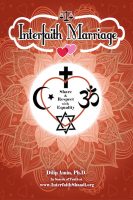Section 4.1: Jewish-Hindu Marriages
Jews and Hindus do not proselytize and there is no historic conflict between them. In this regard, a Jew-Hindu marriage may have less religious conflicts compared to a union with a Christian or a Muslim. There are many Jew-Hindu weddings that are performed in the same marriage hall. A Hindu priest performs the routine Hindu ceremony and a Rabbi performs the Jewish wedding. Both participants wear wedding costumes to match the wedding being performed at the time. However, the major issue will come after childbirth when it is a time to circumcise the baby boy, name the child and declare the faith of child.
In some cases, Jews are permitted to marry any adherent of a monotheistic religion (like Christianity and Islam), as long as any children of the marriage are brought up as Jewish. Modern Conservative Judaism does not sanction intermarriage but encourages acceptance of the non-Jewish spouse within the family and hopes that such acceptance will lead to the spouse’s conversion to Judaism. Some rabbis from the denominations of modern Judaism (Reform, Reconstructionist, and Renewal), are generally willing to officiate at interfaith marriages; they do, however, still try to persuade interfaith married couples to raise their children as Jews. Unfortunately, many Jewish partners find that these issues or concerns are not present for them while dating, yet parental or personal hopes for Jewish children often arise later in the relationship with a Hindu or other non-Jewish partner.
In the USA between 2005 and 2013, more than half (58%) of marriages involving Jews were intermarriages with non-Jewish partners. The possibility that this might lead to the gradual dying out of Judaism is regarded by most Jewish leaders as precipitating a crisis; some religious conservatives now even speak metaphorically of intermarriage as a silent holocaust.
Most Jewish leaders challenge the notion of raising a child in more than one tradition. This is the most critical question a Dharmic (Sikh, Jain, Hindu or Buddhist) considering relationship with a Jew should ask: are Coming of Age bris/bar mitzvah/bat mitzvah ceremonies of children expected to declare them Jews?
“This is my covenant, which you shall keep, between me and you and your descendants after you: every male among you shall be circumcised,” God commands Abraham (Genesis 17:11), the Jewish patriarch. “Any uncircumcised male who is not circumcised in the flesh of his foreskin shall be cut off from his people; he has broken my covenant.” Some traditional Jews believe that if a baby is not circumcised by bris ceremony, something negative would happen to the boy. Some Jewish leaders believe that if a baby boy is not circumcised, the child will not feel a part of the Jewish community and some may not accept him as such.
Earlier the author has discussed if circumcision is science or superstition. Probably it is not the scientific merit, but the religious belief that plays a major role in the decision to cut or not to cut.
Both Jews and Hindus believe that there is only one Ultimate Supreme Reality. However unlike Hindus, Jews are forbidden to express the same God in different forms. The fact that many Gods and Goddesses are worshipped by Hindus is erroneously considered to be polytheistic idol worship by many who do not understand the true nature of Hindu Dharma.
If a Dharmic is considering a lifelong relationship with a Jew, it would be wise to know what kind of interpretations of scriptures your intended spouse has learned during his/her lifetime and believes in. First, ask what does “God” mean to him or her? Is the LORD your God who talked to Abraham, Israel and Moses also the same one who later gave messages through Jesus and talked to Mohammad? Are Hindu Goddess Lakshmi and Lord Krishna incarnations of the same LORD God of Israel? During a Hindu wedding ceremony, the Hindu priest will invoke many Gods from heaven and earth. Jewish men or women planning a marriage to Dharmics must consider: are they willing to take part in such a wedding and will they be comfortable entering Hindu, Jain, Sikh or Buddhist temples, taking prasad (offerings from God) or being part of other Hindu rituals.
Initial impressions of “tolerance” and “open-mindedness” are not concrete and easily shift under pressure. Decisions must be made based on measurable promises.
For many issues listed on the next page, there is only one possible way. If an explanation is given that it is a matter of faith, an interfaith couple will have to decide whose faith will rule the married life. If a Hindu youth really wants to learn the truth about the intended Jewish spouse, decline the bris circumcision and bar/bat mitzvah for a child and watch the reactions.
It is hoped that today’s youths considering interfaith relationships understand that some of the religious commandments are not to be taken literally. Every human being is God’s “chosen” person. One should be free to express their belief in God in any form and way one desires. Pluralism is the only way for couples considering interfaith marriage with equality.

Next Section, Next Chapter, Prior Section, Prior Chapter

A Chapter from the book Interfaith Marriages: Share and Respect with Equality is posted here. View some of others chapters from the book here.
Video messages by the author
How to purchase the book (as low as Rs.270 or $14.99).
Return to Home, Blogs, How to Share? Facebook, Youtube, Twitter, Book, Media.

